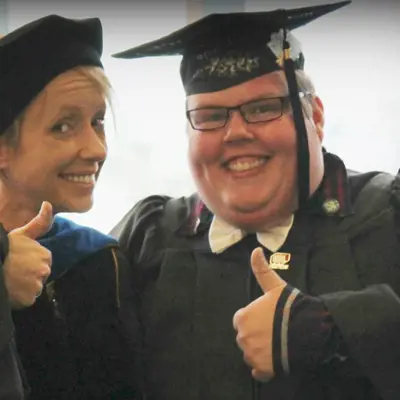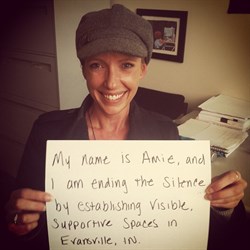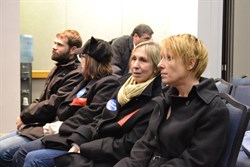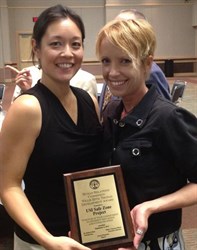
The evolution of an activist
How McKibban found her voice and inspired others to find theirs
February 3, 2014
If you knew that you had only one final speech to give, what would you say? On a college campus where students listen to lectures daily, that question becomes even more daunting. Dr. Amie McKibban, assistant professor of psychology, finds herself in this position as she prepares to pen what she calls "the hardest lecture I've ever written." On February 19 she'll kick off a new lecture series called the Last Lecture, based on a speech by Carnegie Mellon professor, Randy Pausch, who after learning he had pancreatic cancer and mere months to live, gave a final speech, which went on to become a YouTube sensation.
 |
Facing difficult challenges is by no means new to McKibban, who has realized a personal evolution as an activist for Lesbian, Gay, Bi-sexual, and Transgender (LGBT) issues. "I made the conscious decision in 1998 to be an active ally and to 'fight the good fight,'" she said. The decision came shortly after a family member came out as gay. There was one conversation where her relative described the harassment she had been facing, broke down in tears and asked, "Why me?" McKibban realized this wasn't a question she could answer for her. "That's when I knew I needed to be an activist. I needed to be that voice she couldn't be, because being that voice for herself meant making herself vulnerable and putting herself in dangerous situations."
Springing from this powerful moment, she has slowly found the courage to be more visible and take more risks. You don't wake up one morning ready to take the stage and change the world. It's a process that takes time. "I don't know that I'm more courageous than any other person out there," she said. "I have opportunities and I take advantage of those opportunities to be visible."
 |
McKibban shares this understanding with her students and others seeking advice on how to become involved in social justice issues. Her advice: "Start small. Do some self-reflection and find your own comfort level. Once you find it, push it just a little but don't push it too far."
It's natural to have a "save the world" mentality. But, McKibban realized quickly "the reality of social justice work is that you're much more effective when you focus on one issue instead of spreading yourself thin over many issues." She encourages students and others, to find that one area that speaks to them. "Find that one area that you're extremely passionate about - the one perhaps you lose sleep over - and focus your energies there," said McKibban.
 |
McKibban's focus on LGBT issues has resulted in the training of more than 300 individuals, mostly on the USI campus, through an initiative called Tri-State Area Safe Zone Initiative. Co-founded by McKibban and fellow faculty member, Dr. Stephanie Young, assistant professor of communication studies, the initiative, which began as a training session at USI for students, faculty, and staff concerning LGBT issues and hardships, has since grown to include the neighboring campus of the University of Evansville, as well as broader community training. Safe Zone received the Willie Effie Thomas Organizational Diversity Award from the Human Relations Commission and the office of Evansville mayor, Lloyd Winnecke.
"Working with Amie McKibban is incredibly rewarding because she inspires me to be a better person, to be more active in my community, and to come together for the good of the people around me," said Amy Montz, assistant professor of English. "As a colleague, I am proud to work alongside of her. As a community member, I am grateful to have Amie working for the betterment of those who don't always have a voice. Her voice is powerful, and it is fierce."
These days, McKibban is gearing up for a new project. Through a USI grant, she'll be working on a LGBT community asset map, a project she's had on her mind since moving to Evansville. The wide-scale community project will give businesses, churches, non-profits, health care providers, and many other groups, the opportunity to complete an online assessment to determine how inclusive they are. She hopes to launch the year-long project in April and it will include students, research assistants, and a host of community partners who are attaching their name to the asset map as sponsors. ♦